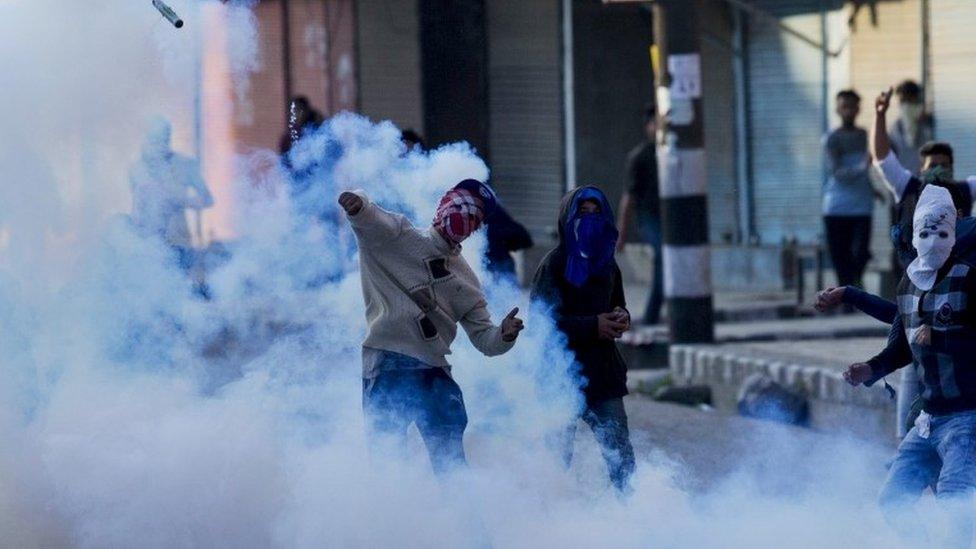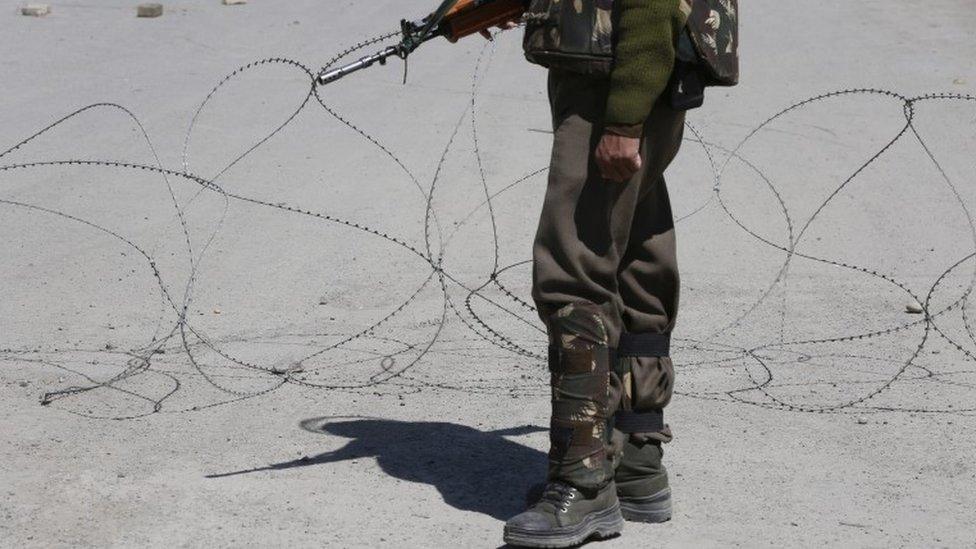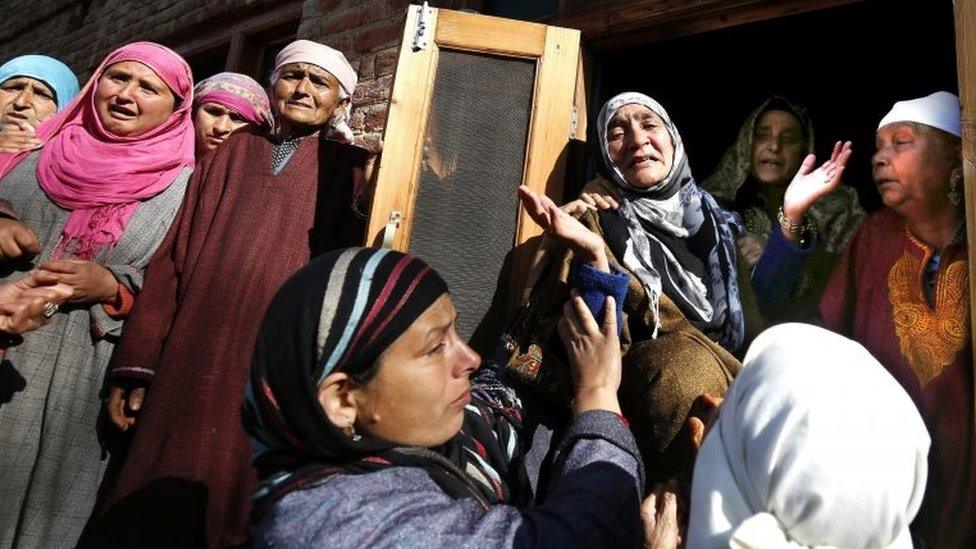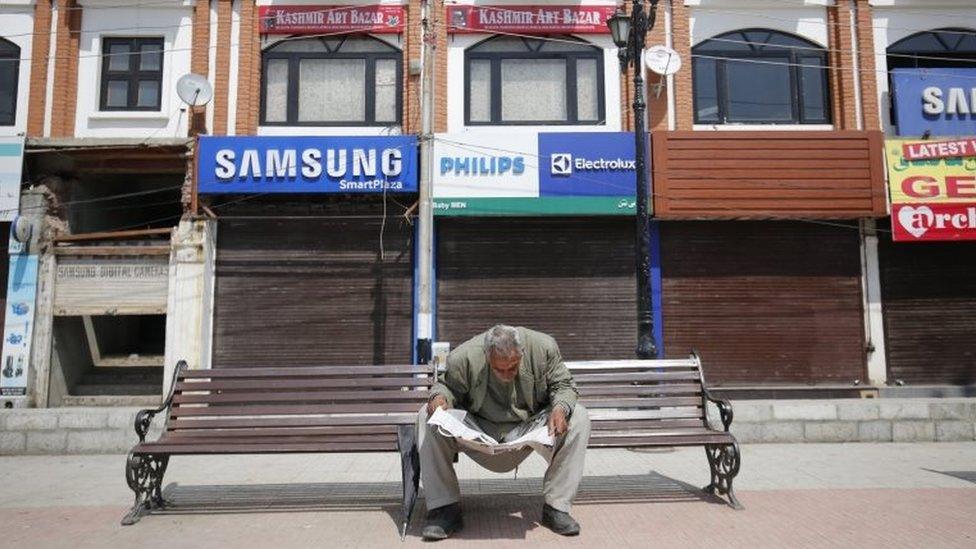Why are there deadly protests in Kashmir?
- Published

Protests began in Handwara town on Tuesday after rumours that a teenage girl was allegedly molested by a soldier
Indian-administered Kashmir has been witnessing protests for the past two days and large parts of the valley are shut. Srinagar-based journalist Shujaat Bukhari explains why the local people are angry.
Since Tuesday, four civilians, including a 21-year-old budding cricketer and a middle-aged woman, have been killed. Many parts of Srinagar are under severe police restrictions and a curfew is in place in the border towns of Kupwara and Handwara.
Three of the deaths took place in Handwara town, north of Srinagar, on Tuesday, after rumours that a teenage girl was allegedly molested by a soldier. The fourth victim - a teenage boy who was hit by a teargas shell in nearby Drugmula - died in hospital on Wednesday.
Once news of the alleged molestation spread, people, mostly youths, assembled, shouting slogans. Some of them were seen chasing (in a photograph posted on social media) a soldier.
Reports say local police initially tried to pacify the protesters, but the situation soon spiralled out of control as the number of people swelled.
Caught unawares
The protesters then targeted an Indian army bunker in the town.
The soldiers retaliated with a burst of fire that killed two young men - Mohammad Nayeem, 21, and Mohammad Iqbal, 22. A 54-year-old woman was also hit by a bullet and later succumbed to her injuries in hospital.
The town was soon on the boil and the government was caught unawares.

The security forces enjoy little credibility in Indian-administered Kashmir
Soon, protests had reached the rest of the Muslim-majority Kashmir Valley, with the separatists calling the incident an example of "state terrorism" and asking people to observe a strike.
Handwara was sealed with reinforcements, and the army was quick to express "regret" for the killings, promising an impartial probe.
Mehbooba Mufti, who took over as the chief minister of the "most difficult state in India" just 10 days ago, was in Delhi and, according to officials, holding "scheduled meetings" with Home Minister Rajnath Singh and others.
She issued a statement expressing grief and assuring justice to the families of those killed.
But that has not calmed tempers.
With mistrust against Indian security forces running high in Kashmir, even small incidents involving the army, the paramilitary or the police often take a serious turn. The controversial Armed Forces Special Powers Act (AFSPA) which gives security forces almost draconian powers, has contributed to this sentiment.
And now there's another twist to the story.
A viral video
A video has begun circulating showing a girl - purported to be the "victim" of the molestation - who is heard telling an unknown person that she was "hounded by two local boys" who "took objection to something" she did.
She does not directly deny an encounter with the army man, but that is the inference one can make.
The video went viral on social media, and later the army also gave it to journalists, though after blurring the girl's face.

Since Tuesday, four civilians, including a 21-year-old budding cricketer and a middle-aged woman, have been killed
This had led to severe criticism from civil society and local politicians, who are asking how the army could release the video of the "victim".
A senior army official said "it was important to release the video to counter the propaganda unleashed by some people to malign our image", but many are not convinced.
"The police or the army cannot reveal the identity of a molestation victim, but unfortunately they have gone a step ahead by shooting her video and releasing it," lawyer Zaffar Shah said. "It is a serious offence."
Human rights activist Khurram Parvez asked if the army was trying to legitimise the civilian killings by releasing the video.
"Under which law did the army release the video of a teenage girl's questioning in police custody? This is not even admissible in a court of law."

Many parts of Srinagar are under severe police restrictions and a curfew is in place in the border towns of Kupwara and Handwara
Many Kashmiri people have also taken to social media to question the veracity of the video.
It is difficult to say whether the video is genuine or not, or about the role of the two boys the girl has mentioned there, but it is a reflection of the larger problem the government is facing in Kashmir.
Even if the video is genuine, the government's credibility is so low in the state that the average citizen is not ready to believe it.
Moreover, many are sceptical that the inquiries ordered by the army and the civil administration into the killings of the four people will have any results.
In the past, such inquiries have either been shelved or have exonerated the forces.
But Sajjad Lone, the local legislator, is confident that justice will be delivered.
"We will ensure justice to the families of those killed. It is an unfortunate situation that could have been avoided," he told the BBC.